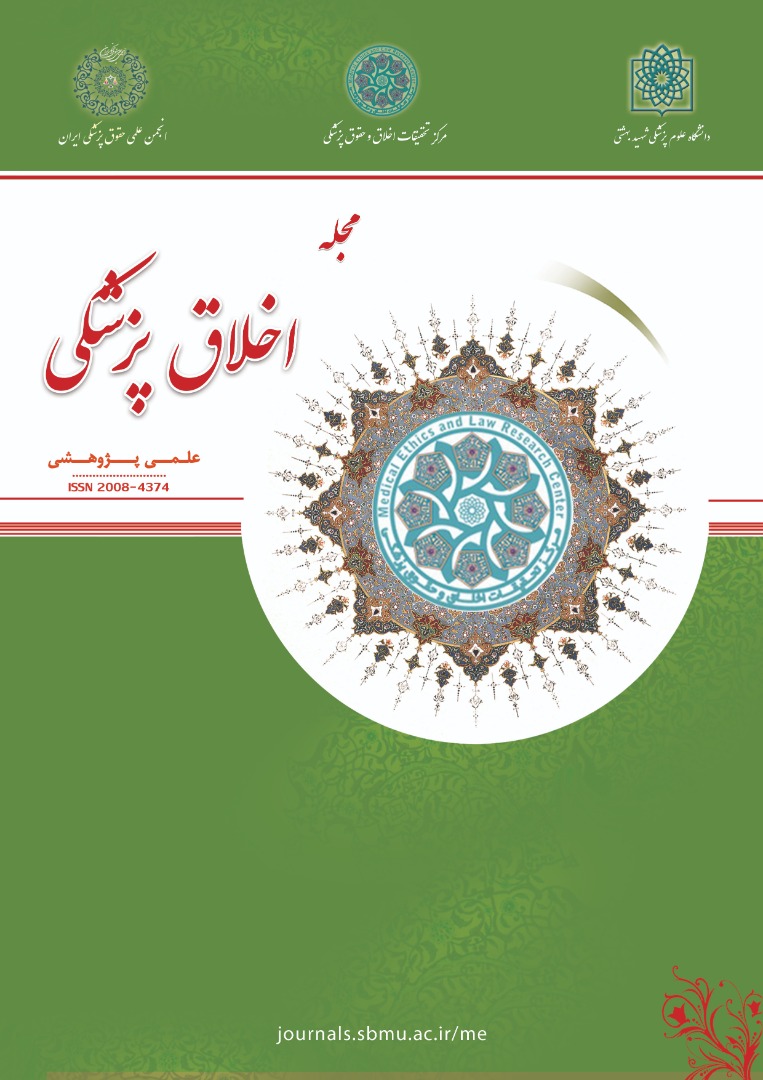بررسی تنیدگی اخلاقی پرستاران شاغل در بیمارستانهای منتخب دانشگاه علوم پزشکی شهید بهشتی
مجله اخلاق پزشکی - علمی پژوهشی,
دوره 9 شماره 32 (1394),
21 July 2015
,
صفحه 121-140
https://doi.org/10.22037/mej.v9i32.9855
چکیده
مقدمه: تنيدگي اخلاقي به دلیل اثرات نامطلوبي نظير احساس ناکامي وگناه، عدم امنيت، ترس، دلسردي و افسردگي در پرستاران ميتواند بر شخصيت و عملکرد حرفهاي آنان تأثیر بگذارد. مطالعه حاضر با هدف تعیین میزان تنیدگی اخلاقی پرستاران شاغل در بیمارستانهای آموزشی وابسته به دانشگاه علوم پزشکی شهید بهشتی، در سال 1393 انجام شده است.
روش: این پژوهش، یک مطالعه توصیفی ـ مقطعی است که بر روی 200 نفر از پرستاران شاغل انتخاب شده به روش نمونهگیری تصادفی ساده انجام شده است. برای جمعآوری دادهها از پرسشنامه دیسترس اخلاقی کورلی و برای تجزیه تحلیل دادهها از نرمافزار 21 SPSS استفاده گردید.
یافتهها: میزان تنیدگی اخلاقی پرستاران در سطح متوسط گزارش شد. میانگین تنیدگی اخلاقی در حیطه خطاهای حرفهای، بالاتر از دیگر حیطهها بود. بين تنیدگی اخلاقي و ویژگیهای جمعیتشناختی پرستاران ارتباط آماری معنیداری مشاهده نشد. (0/05<P)
نتیجهگیری: با توجه به سطح تنیدگی متوسط در پرستاران شرکتکننده در مطالعه، مدیران سازمانی و پرستاری باید ساختارهایی طراحی کنند که شرایط استرس کاری پرستاران را کاهش داده و از پرستارانی که تنیدگی اخلاقی رنج میبرند، حمایت نمایند. تلاش برای کاهش بیشتر میزان تنیدگی اخلاقی در پرستاران و بررسی سایر عوامل اثرگذار توصیه میگردد.
- تنیدگی اخلاقی؛ حرفه پرستاری؛ اخلاق حرفهای
ارجاع به مقاله
مراجع
Meltzer, LS. Huckabay, LM. (2004). Critical care nurses’ perceptions of futile care and its effect on burnout. American Journal of Critical Care. 13 (3): 202-8.
Abbaszadeh, A. Borhani, F. Kalantari, S. (2011). Ethical distress in nurses working in Bam therapeutic centers. Journal of Medical Ethics. 5 (17): 119-40.
Akbarbegloo, M. Valizadeh, L. (2009). Professional stress and adjustment strategies in nurses working in mental Department of Razi hospital in Tabriz. Journal of Modern Cares. 8 (1): 45-51.
Alavi Arjmand, N. Kashaninia, Z. Hoseini MA. Rezasoltani, P. (2013). Study effect of stress management on professional stress and conflict of work and live in nurses. Hayat, Journal of Nursing and Midwifery. 4 (18): 81-91.
Ameri, M. (2012). Study stress and its related factors from perspective of nurses working in Oncology department of educational hospitals in Tehran. Mastering Thesis, Nursing and midwifery school of Shahid Beheshti University of Medical Sciences.
Atashzadeh Shourideh, F. (2012). ICU nurses’ ethical stress: Design the tools and test of method. Thesis of nursing PhD. Nursing and Midwifery school of Shahid Beheshti University of Medical Sciences.
Atashzadeh Shourideh, F. Ashktorab, T. Yaghmay, F. (2012). Response of ICUs nurses to moral distress: A qualitative Study. Journal of Critical Care Nursing. 4 (4): 159-68.
Bigdeli, I. Karimzadeh, S. (2006). The effect of tension factors on mental health nurses in Semanan. Sci J Semnan Univ Med Sci. 8 (2): 21-6.
Borhani, F. Alhani, F. Mohammadi, E. Abbaszadeh, A. (2009). Professional Ethical Competence in nursing: the role of nursing instructors. Journal of Medical Ethics and History. 2 (3): 27-38.
Corley, MC. Elswick, RK. Gorman, M. Clor, T. (2001). Development and evaluation of a moral distress scale. Journal of Advanced Nursing. 33 (2): 250-6.
Corley, MC. Selig, P. (1994). Prevalence of principled thinking by critical care nurses. Dimensions of Critical Care Nursing: DCCN. 13 (2): 96.
Elpern, EH. Covert, B. Kleinpell, R. (2005). Moral distress of staff nurses in a medical intensive care unit. American Journal of Critical Care. 14 (6): 523-30.
Hamric, AB. Davis, WS. Childress, MD. (2006). Moral distress in health care professionals. The Pharos of Alpha Omega Alpha-Honor Medical Society Alpha Omega Alpha. 69 (1): 16.
Heydari, A. Mazlum, SR. Ildarabadi, E. (2012). Nursing in the health care delivery system in Iran. 7 (25): 37-44.
Jameton, A. (1984). Nursing practice: the ethical issues Englewood Cliffs. Copyright Jim Summers. Business and Professional Ethics Journal. 4 (1): 83-7.
Joolaie, S. Jalili, H. Rafiee, F. Haghghani, H. (2010). Study relationship between nurses’ understanding from moral tension and ethical environment in selected departments of educational-therapeutic centers of Tehran University of Medical sciences. Journal of Medical Ethics and History. 4 (4): 56-66.
Millette, BE. (1994). Using Gilligan's framework to analyze nurses' stories of moral choices. Western Journal of Nursing Research. 16 (6): 660-74.
Range, LM. Rotherham, AL. (2007). Moral distress among nursing and non-nursing students. Nursing Ethics. 17 (2): 225-32.
Rasuli, M. Tafrashi, Z. Mohammadnejad, E. (2014). Challenges in clinical nursing education in Iran and strategies. Journal of Clinical Excellence. 1 (2): 11-22.
Redman, B. Fry, ST. (2000). Nurses ethical conflicts: what is really known about them? Nurse Ethics. 7 (4): 360-6.
Salamzadeh, E. Saghafi, A. Khaghanizadeh, M. Salari, M. (2012). Study ethical stress in nurses working in selected hospital of armed forces. Mastering Thesis, Nursing School of Baghiyatallah University of Medical Sciences, Tehran.
Salsali, M. Cheraghi, MA. Zaghari Tafreshi, M. Noktedan,H. Mehrdad,N. Maddah, B. Givari, A. (2011). Professional standards of nursing care. First edition. Tehran: Publications Mehr Ravash.
Solomon, MZ. O’Donneu, L. Jennings, B. Guilfoy, V. Wolf, SM. Nolan, K. Jackson, R. Koch Weser, D. DonneDley, S. (1993). Decisions near the end of life: professional views on life-sustaining treatments. American Journal of Public Health. 83 (1):14-23.
Wilkinson, JM. (1987-1988). Moral distress in nursing practice: experience and effect" Nurse Forum. 23 (1): 16-29.
Zuzelo, PR. (2007). Exploring the moral distress of registered nurses.
- چکیده مشاهده شده: 2037 بار
- PDF دانلود شده: 1029 بار
